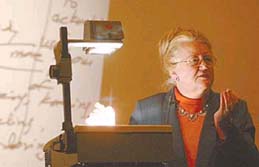“There’s too much feeling about race and not enough thinking about racial privilege and power structures,” said Peggy McIntosh, Associate Director of the Wellesley College Center for Research on Women, early in her speech Nov. 17 in Dana Auditorium.
Judy Harvey, Director of Community Learning and Bonner Scholars said, “I knew that much of [McIntosh’s] work has been done around the issue of gender bias and I thought she might help the Guilford community think about the intersection of sexism and racism as well as deepen our understanding of white privilege, an important concept in working from an anti-racist analysis.
“Her presentation was the final and fifth anti-racism forum for the fall semester which were all planned to help the Guilford community continue to think and talk about racism from an anti-racist perspective.”
McIntosh said that when she first began noticing white privilege, one of Virginia Woolf’s writings inspired her to continue questioning the problem.
Woolf wrote about a time at her desk, looking at a marsh, when she saw a black fin that arched and went back down. Though she couldn’t see, she knew the fin was attached to something big.
McIntosh said she first recognized white privilege when she realized the similarities between the actions of the men in a seminar she participated in about getting women into liberal arts curriculums and two essays she read in 1980 where black women in Boston said white women were oppressive in the work place.
Every spring, the men and women in that seminar would argue because the men would say there was no room in the curriculum for women, so McIntosh began to think the men in the seminar were oppressive even though they were nice people.
She remembered the essays and thought then that perhaps she was oppressive to black women in the same way these men were oppressive to her.
“Maybe whiteness opened doors for me,” said McIntosh as she described her thought process when she began to wonder if she held a tenured position partly because of her race.
At that point in her life, she asked herself if there was “anything outside the knowledge system that put me ahead by my race.”
Though the question scared her, she stuck with it and in the next three months she came up with 46 unearned advantages. Many of these were compiled in her 1988 article “White Privilege: Unpacking the Invisible Knapsack,” which she distributed to the audience.
“I can be sure my children will be given curricular materials that testify to the existence of their race,” said McIntosh in her article. “If I want to, I can be pretty sure of finding a publisher for this piece on white privilege.”
She said that the Harvard Review wanted to print her article, but she agreed only if they printed an article by someone of color. Harvard Review said they didn’t have room. McIntosh offered to cut her article in half to make room, but they said that would lower their standard.
McIntosh then said unearned power can be used to weaken systems of unearned power. With regard to what the dominant could gain from abandoning their oppressive power, McIntosh said that they wouldn’t be hated and feared after their power is checked.
First-year Genny Uhl said, “Although there was a great deal of controversy in the ideas Peggy addressed, her talk was still able to foster discussion and get people to look at these issues more critically.”
“I hope we all got a chance to think about a system of privilege that is hard for white people to notice,” said Harvey.
Categories:
Intersection of sexism and racism
dylan grayson
•
December 5, 2003

Peggy Mcintosh delivers a lecture at Wesley College (www.collegian.psu.edu)
0
More to Discover
